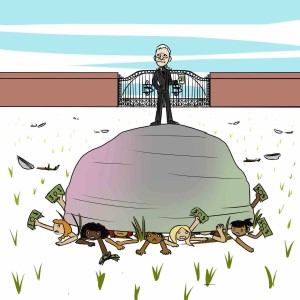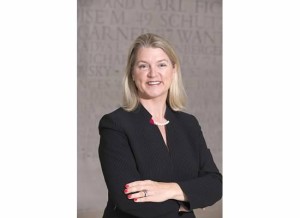
Update: When this post was originally written, I was working hard to save my alma mater, Sweet Briar College. While I did not like Mark Herring’s initial reaction to the former board’s decision to close the College, I would like to thank him for, ultimately, assisting Sweet Briar. Furthermore, my opinion on Mr. Herring was narrowly focused on this one issue. When I consider what I care about – women’s issues, the environment, health care access, education, and more — Mark Herring would be my favored candidate for office. Now, onto the original post….
As many know by now, I am passionately fighting the closure of my beloved College, Sweet Briar, by the President and the Board. I have written about my thoughts on the lack of governance. This post will focus on the curious and shocking lack of leadership by the Virginia attorney general, Mark Herring (you can find his contact form here), contrasted to the swift action of the County Attorney, Ellen Bowyer. I also share another example of leadership by the New York attorney general intervening in the Cooper Union College.
In the early days of the Sweet Briar College closure announcement, the Virginia attorney general remained strangely silent on the matter of the announced closure. The President and Board referenced meetings with Mark Herring, Virginia’s attorney general, to “unwind” College operations and unrestricted the endowment for the purpose of closing. This stunned me. There was no leadership by the Virginia Attorney General with respect to an investigation into the closure — which would seem a logical first step (well before any closure announcement, but certainly upon learning of one).
State attorneys general oversee nonprofits both because they’re generally exempt from state taxes and because they represent the interests of donors who may lack the means to enforce the terms of their gifts or, once they’re dead, the capacity. (Since such institutions are also exempt from federal taxes, the Internal Revenue Service is charged with ensuring that organizations adhere to their tax-exempt purposes.) Credit: Michael Appleton for The New York Times
The County Attorney of Amherst, Ellen Bowyer, has boldly taken action on behalf of donors and to request an injunction. Her suit charges that:
Closure would violate the terms of the will under which the school was founded and that charitable funds have been misused in violation of state law. (Susan Sverlunga, Washington Post).
Mark Herring, by contrast, evidently is HELPING the leadership of Sweet Briar College to release restrictions on donor’s contributions given over the years. As a fundraiser, I find this terribly concerning. I’ve written about the topic of protecting donor intent here.
Virginia Senators have written to the attorney general to express concern and to ask that he take action to protect the rights of donors and the substantial campus.
On Wednesday, Sen. Chap Petersen, D-Fairfax, asked Herring to issue a legal opinion on what must be done with money and other gifts that have been given to the college, including its substantial campus. He also asked Herring to clarify the obligations of Sweet Briar’s board of directors.
“It seems to me if their duty is to try to fulfill the mission of the school, they ought to be making some effort to keep it open or at least look at the option of keeping it open,” Petersen said. (Alicia Petraska, Lynchburg News and Advance)
Cooper Union College in New York is under scrutiny by the New York attorney general, Eric T. Schneiderman. It provides a contrast in leadership and action:
In what should be a ringing alarm for nonprofit boards across the country long accustomed to minimal scrutiny or accountability, Attorney General Eric T. Schneiderman of New York has signaled that the laissez-faire approach to nonprofit governance is over. (James Stewart, New York Times)
By contrast, Mark Herring of Virginia sees his role as meeting with College officials to violate donor intent. How can he think he is doing his job? One would think he would have more Virginia citizens wanting him to advocate for the College and to examine any possible mismanagement of funds. The Washington Post reported,
Herring essentially argues that in such a situation, with a charitable institution (the college, a nonprofit established in a bequest from an estate) disbanding, the state attorney general has been granted authority by the General Assembly to determine what is necessary to protect the public interest. (Susan Sverluga, Washington Post).
Back in New York, Eric Schneiderman boldly stepped in BEFORE Cooper Union College faced financial ruin. The New York Times reported:
Apart from the impact on Cooper Union itself, what’s striking about Mr. Schneiderman’s investigation is that his office is intervening before its financial problems ruin the school. Cooper Union’s endowment stood at $735 million at the end of its most recent fiscal year and, despite its financial woes, it is in no imminent danger of failing.
“It’s easy to forget, but New York’s charities, collectively, are a big and important part of our state’s economy, and I consider it my responsibility to promote and protect the nonprofit sector,” Mr. Schneiderman told me this week. “In part, we do that by aggressively investigating and prosecuting fraud. But we work just as hard to prevent mismanagement before it starts and, whenever possible, get troubled charities back on track.”
It would be appropriate for the Virginia Attorney General to aggressively review the President and Board of Sweet Briar College. He might consider how the President was elected; whether the Board truly took all measures possible before resorting to closure; whether the financial records accurately state the condition of the College. He might consult neutral experts such as the accounting firm which audited the Colleges’ financial statements most recently or the accrediting body of the College which granted accreditation for another 10 years in 2011.
By contrast, in New York, their attorney general takes action before “disaster strikes”:
The Cooper Union investigation fits into the New York attorney general’s office’s broader strategy to get ahead of potential crises by “stress testing” nonprofits that show signs of potential trouble, such as large operating deficits and excessive spending rates on endowments, said James Sheehan, the chief of the office’s charities bureau. “Once an organization is in trouble, donors don’t want to give money and people don’t want to join the board,” he said. “We want people to anticipate these issues before they become disasters.”
Such disasters have befallen the New York City Opera and Long Island College Hospital, two major New York institutions that collapsed in financial disarray in recent years, and the Crystal Cathedral in California, which filed for bankruptcy protection in 2010 after accusations that its board had imprudently borrowed against the endowment.
Unfortunately, Virginia did not have any “stress testing”. Perhaps it was a matter of staffing or a view of role. However, wouldn’t it be safe to request that the Virginia attorney general take efforts to investigate these types of important matters? Minimally, might he not stand in the way of his own County Attorney who filed suit against the wrongful closure?
The President and Board of Sweet Briar College are now being held accountable by the people they did not inform or allow to help: students, parents, faculty, staff, alumnae and the wider community — the majority citizens of Virginia. Might he not consider the thousands of people begging for at least a proper process within the legal system?
Whatever the outcome at Cooper Union, Mr. Schneiderman deserves credit for putting nonprofit boards on notice that they’ll be held accountable, said Jack B. Siegel, author of a widely used guide for nonprofit directors, whose subtitle is “Avoiding Trouble While Doing Good.” “More states should emulate New York,” Mr. Siegel said.
This is no small matter, given that nonprofits accounted for 9.2 percent of all wages and salaries in the United States and 5.3 percent of gross domestic product in 2010, according to the National Center for Charitable Statistics. Given the many illustrious universities, hospitals, museums, orchestras, theaters and other arts organizations, nonprofits play an outsize role in the nation’s culture. But they have traditionally received little scrutiny until a scandal erupts or they’re on the brink of collapse.
Indeed, more states should emulate New York. Virginia should take a lead and PROTECT Sweet Briar College, its employees, its students and its donors from the reckless leadership of the current President and Board. Sweet Briar College employs hundreds of faculty and staff. Hundreds of students call it home. Millions in the endowment needs to be protected — not raided. Finally, the donor’s will should be honored. The one person in the state who should be advocating for the will of the founder has turned his back. This is very sad.
Thankfully, we have a leader in Ellen Bowyer who took swift action.
“Time is of the essence,” the suit, filed on behalf of the Commonwealth of Virginia by the county attorney, Ellen Bowyer claims, as college officials appear to be rapidly moving to sell assets, destroy documents and “obliterate contractual relationships governing tenancies and endowments.” (Susan Sverluga, Washington Post)
Meanwhile, Saving Sweet Briar, Inc., along with thousands of alumnae, hundreds of students and parents, community members, the citizens of Virginia and people across the country are doing all they can — primarily through donations and grassroots efforts to raise awareness. Please share your comments below and, should you be moved to give, make a commitment here.
To share your comments with Mark Herring, Virginia Attorney General, you can use this contact form.

Stacey Sickels Locke is a proud graduate of Sweet Briar College, Class of 1988. She served as an employee of the College in the early 1990s working on the $25 million Campaign. During that time, she solicited many leadership gifts which make up the current endowment and she feels a sense of duty that those donations are not used for the closure of the College or for any other purposes than the donors intended. Since then, she has spent her career building support for higher education and the nonprofit community as a staff member and consultant for boards. As a volunteer, she has served Sweet Briar since graduation as a fundraiser, admissions ambassador and now advocate for the #saveSweetBriar movement. She is a member of the Association of Fundraising Professionals (AFP), is affiliated (through the University of Maryland) with the Council for Advancement and Support of Education (CASE) and holds a Certified Fund Raising Executive (CFRE) certification from CFRE International.

Share this....
